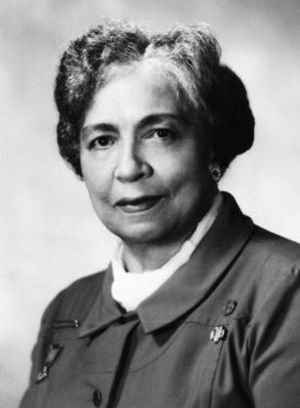Dorothy Celeste Boulding Ferebee facts for kids
Quick facts for kids
Dorothy Celeste Boulding Ferebee
|
|
|---|---|
 |
|
| Born |
Dorothy Celeste Boulding
October 10, 1898 Norfolk, Virginia, U.S.
|
| Died | September 14, 1980 (aged 81) Washington, D.C., U.S.
|
| Alma mater | Simmons College Tufts University Medical School |
| Scientific career | |
| Fields | Obstetrics, gynecology |
| Institutions | Howard University Medical School Women's Institute Mississippi Health Project Alpha Kappa Alpha |
Dorothy Celeste Boulding Ferebee (October 10, 1898 – September 14, 1980) was an American doctor who specialized in helping pregnant women and delivering babies. She was also a strong leader in the civil rights movement.
Contents
About Dorothy Ferebee's Early Life
Growing Up and Family Background
Dorothy Celeste Boulding Ferebee was born on October 10, 1898, in Norfolk, Virginia. She became a pioneer in civil rights and a very important doctor. She worked hard to make sure everyone could get healthcare, especially people who didn't have many resources.
When Dorothy was young, her mother became ill. Dorothy and her brother, Ruffin, went to live with their great-aunt in Boston, Massachusetts. They grew up in a nice neighborhood called Beacon Hill.
Dorothy's family was full of smart people, including eight lawyers. Even though law was a big topic in her home, Dorothy always knew she wanted to be a doctor. From a young age, she loved helping sick or hurt animals. While other girls played with toys, Dorothy was busy "doctoring" her animal friends.
Dorothy's Journey to Become a Doctor
In 1915, Dorothy graduated from English High School with top honors. She then went to Simmons College in Boston. During her time there, she joined the Alpha Kappa Alpha Sorority, a group focused on sisterhood and service.
Right after graduating from Simmons College, she applied to Tufts University School of Medicine. She finished medical school in 1924, ranking among the top five students in her class. In 1927, she was one of only nine women to pass the medical exam in Washington D.C.
Dorothy Ferebee's Amazing Career and Impact
Starting Her Medical Practice
Even though Dorothy was a top student, she faced challenges because of racism. She was not allowed to work as an intern at white hospitals in Boston. So, she moved to Washington, D.C. and started her internship at Freedman’s Hospital. This hospital was owned and run by Black doctors and staff.
After her internship in 1925, Dorothy opened her own medical clinic. It was in a part of the city where many people were poor and needed help. She convinced the leaders of Friendship House, a charity medical center, to open another clinic for African Americans. This clinic was later named Southeast Neighborhood House. She also created the Southeast Neighborhood Society, which had a playground and daycare for children whose mothers worked.
In the same year, she joined the faculty at Howard University Medical School. She became the medical doctor for women there. The next year, she married Claude Thurston Ferebee, a professor at Howard. They had twins, a boy and a girl. In 1949, she became the medical director for Howard’s Health Services. She held this important job until she retired in 1968.
Helping Communities and Fighting for Rights
Dorothy Ferebee continued to live in Washington D.C. and work at Howard University. However, during the summers from 1935 to 1942, she directed the Mississippi Health Project. This project was sponsored by her sorority, Alpha Kappa Alpha. It provided healthcare to poor farming families in Mississippi.
She also became a very active member of the civil rights movement. She joined the National Council of Negro Women (NCNW). In 1949, she was elected president of this organization. As president, she worked even harder to improve healthcare and education. She also fought to end unfair treatment against African Americans and women in many areas, like housing, jobs, and voting.
Dorothy created her "Nine Point Program." This plan aimed to achieve basic civil rights through education and new laws. Through all this important work, Dorothy remained a full-time doctor, helping many patients.
Global Impact and Later Life
Dorothy Ferebee was dedicated to helping others and fighting for civil rights. She was involved in many national and international organizations. She served on boards for the White House’s Children and Youth Council and UNICEF (United Nations Children’s Fund).
The U.S. State Department even chose her to represent the country at a meeting of the International Council of Women of the World in Greece. She also traveled to Germany to see how postwar conditions affected women and children. In 1963, she went to Selma, Alabama, to help African Americans register to vote. There, she also spoke about women's rights.
In 1967, Dorothy was chosen as one of five U.S. delegates to the World Health Organization’s meeting in Geneva, Switzerland. She also chaired the D.C. Commission on the Status of Women from 1971 to 1974.
Dorothy Celeste Boulding Ferebee passed away on September 14, 1980, in Washington D.C. She left behind a legacy of tireless work for health and equality.
 | Kyle Baker |
 | Joseph Yoakum |
 | Laura Wheeler Waring |
 | Henry Ossawa Tanner |

